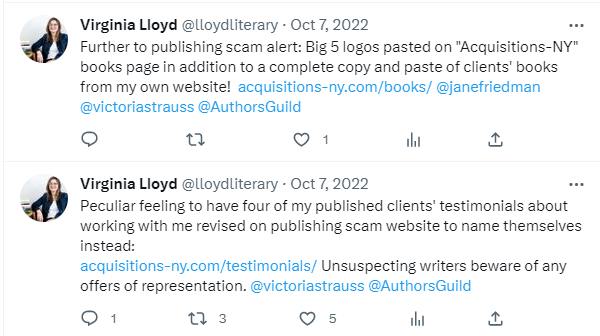From Writer Beware:
Among the most common scams targeting self-published and small press authors these days are fake literary agency scams.
These are slightly different from the agent/agency impersonation scams I’ve written a number of posts about, in that they don’t appropriate the identities of real people (most of the time). But that doesn’t mean they’re not equally deceptive.
They work like this.
- You’re contacted out of the blue by phone or email by someone describing themselves as a literary agent, offering to represent you or endorse you or otherwise transition you to a traditional publishing contract or have your book made into a movie. Sometimes they’ll even tell you they already have interest from a Big 5 publisher or a major film studio. The agent claims to work on commission only–no upfront fees!
- But wait–there are things you need to do in order to access that coveted contract or movie rights offer: re-publish your book, have a screenplay written, undertake a PR campaign, buy “book insurance”…the list goes on. If you don’t have those things on hand, or don’t know how to access someone to provide them, the agent just happens to know of a trustworthy company that can provide them for you. Of course, there’s a fee. But you have to spend money to make money, right?
- You hand over the payment: anywhere between a few hundred and a few thousand dollars. Sometimes that’s the last you’ll hear from your “agent”. More often, your payment tells the scammer you’re a willing mark. And so….
- You’re bombarded with offers to spend more money on book fair representation, bookstore promotions, book-to-screen services, New York Times ads, pay-to-play radio and TV interviews, and more. Every time you pay, you incentivize the scammer to ask again. The prices get higher, the services more fraudulent–all supposedly in aid of obtaining the coveted contract you were promised at the start. Eventually you may receive forged contracts from Big 5 publishers or production companies–always, somehow, requiring you to pay enormous sums of cash.
- Once you get suspicious and start asking questions, or balk at payment, or the scammer decides you’re tapped out, they ghost you.
I’ve heard from writers who’ve spent $70,000, $100,000, $300,000, and even more on such frauds.
There are three components to a fake literary agency scam.
- One (or more) fake agencies
- One (or more) “trustworthy” service providers
- A parent company overseas, usually in the Philippines, that runs the scam with a brigade of sales reps using American-sounding aliases. This is where your money ultimately goes.
Here’s a real-life example.
Acquisitions NY purports to be a literary agency with a mission of “Empowering Authors Everyday…by providing contemporary solutions that have been tried and tested throughout time.” Its web domain was registered in July 2022.
If you visit Acquisitions NY’s website today, you’ll note that it’s bare of certain things a reputable agency’s website typically includes, such as a client list and a list of recent sales. In an earlier incarnation, those things were present…but oops…

Acquisitions NY removed the pilfered book images and testimonials, but continued to use them in solicitations for some time afterward, as you can see from this flashy document they were sending out as late as last December. (Here’s Virginia Lloyd’s testimonial page for comparison.)
In another theft, Acquisitions NY’s Who We Are page for some time falsely claimed real agent Ian Bonaparte of Janklow & Nesbit as part of its team. Again, they got caught out:

Ian’s (real) bio and (fake) photo are no longer on the website, but his name is still being used, as you’ll see below.
Acquisitions NY’s solicitations have varied over time, but the ones they’re currently sending out claim that authors have been chosen for “one of the most-coveted 10 spots” in the (entirely fictional) Mark Twain Literary Fund, which supposedly makes it possible for representation to be provided “pro bono” (which of course is not a thing).
Link to the rest at Writer Beware
Lots of links in the OP.
“writers who’ve spent $70,000, $100,000, $300,000, and even more” boggles the mind.
If I had that kind of budget, I have far better ways of becoming a bestseller! Hollywood, probably not so much.
But readers? Who is that stupid to spend that much without it being real?